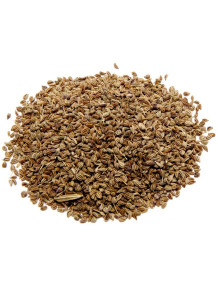Ajowain (Ajwain, Ajowan) Oil
- Product Code: 7712
Trachyspermum Ammi Seed Oil
Guaranteed 100% natural product
Trachyspermum Ammi Seed Oil
Guaranteed 100% natural product
Ajwain oil, also known as ajowan oil or ajwain seed oil, is an essential oil extracted from the seeds of the ajwain plant, scientifically known as Trachyspermum ammi. Ajwain is a small, annual herbaceous plant belonging to the Apiaceae family and is native to the eastern Mediterranean region and parts of Asia.
The oil is obtained through steam distillation of the crushed seeds, resulting in a highly aromatic and concentrated liquid with a strong, pungent, and slightly bitter aroma.
Here are some common uses and benefits of ajwain oil:
Digestive health: Ajwain oil is prized for its digestive properties and can help alleviate symptoms of indigestion, bloating, gas, and stomach upset. It can help stimulate digestion, reduce flatulence, and soothe stomach discomfort when diluted and massaged onto the abdomen or added to a warm cup of tea.
Respiratory support: Ajwain oil is believed to have respiratory benefits and can help relieve symptoms of congestion, coughs, and respiratory infections. Inhaling ajwain oil through steam inhalation or diffusing it in the air can help clear the airways, loosen mucus, and promote easier breathing.
Pain relief: Ajwain oil has analgesic properties that can help relieve muscle aches and pains, joint pain, headaches, and menstrual cramps. It can be diluted with a carrier oil and applied topically to affected areas for soothing relief.
Antimicrobial properties: Ajwain oil has strong antimicrobial properties due to its high content of thymol and other compounds. It can help inhibit the growth of bacteria, fungi, and viruses, making it useful for disinfecting wounds, purifying the air, and supporting immune health.
Culinary uses: Ajwain oil is sometimes used as a flavoring agent in culinary applications, particularly in Indian and Middle Eastern cuisines. It adds a warm, pungent flavor to dishes such as curries, soups, stews, and bread, and is often used in spice blends and pickles for its distinct aroma and flavor.
| Mechanism | - |
| Appearance | - |
| Longevity | - |
| Strength | - |
| Storage | - |
| Shelf Life | - |
| Allergen(s) | - |
| Dosage (Range) | - |
| Recommended Dosage | - |
| Dosage (Per Day) | - |
| Recommended Dosage (Per Day) | - |
| Mix Method | - |
| Heat Resistance | - |
| Stable in pH range | - |
| Solubility | - |
| Product Types | - |
| INCI | - |
Purchase History for
Cart
No products



